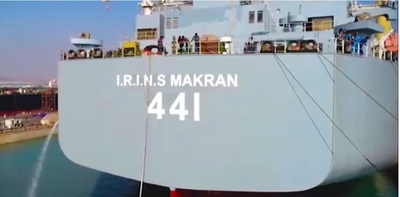 The presence this week of two Iranian warships docked in Rio de Janeiro reinforces a top commander's pledge that the Islamic Republic wants an offensive military capability in Latin American waters.
The presence this week of two Iranian warships docked in Rio de Janeiro reinforces a top commander's pledge that the Islamic Republic wants an offensive military capability in Latin American waters.
Frigate Dena and the warship Makran docked Monday for a reported one-week stay in Brazil. The specifics of the visit remain unclear.
In addition to being the Iranian Navy's newest warship, the former oil tanker Makran also is its largest. Like the U.S. Navy's Expeditionary Sea Base, the Makran is expected to serve as a mobile sea base for small boats and planes capable of operating anywhere in the world.
In 2021, the Pentagon learned that Makran was en route to Venezuela with seven high-speed missile boats on board. Following U.S. diplomatic pressure, Venezuelan officials ultimately denied the ship's entry.
Dena is armed with four Qader anti-ship missiles that have a range of 300 km and are described by Iranian officials as "the most powerful and precise missile of the Islamic Republic of Iran's Navy."
"So far, we have been present in all the strategic straits of the world," Iranian Rear Admiral Shahram Irani said Jan. 11. "This year we are planning to be present in the Panama Canal."
Panama, which is about 3,000 kilometers (1,864 miles) from the southern United States border, may be the ships' next stop. The canal connects the Atlantic and Pacific oceans and is one of the world's most strategic waterways.
As a result, the Panama Canal is an essential shipping lane for international trade, and any disruption in its operations would have enormous consequences for the global economy. Furthermore, Venezuela, Iran's primary regional ally, is located near the maritime routes to and from the Panama Canal.
Iran has increased its naval activities in recent years, including in the Red Sea, Raz Zimmt, a research fellow at Israel's Institute for National Security Studies (INSS) told the Investigative Project on Terrorism (IPT).
"It seems that Iran is interested in expanding its military, and especially its naval cooperation with Brazil as part of its efforts to improve its military, including its naval, capabilities through joint cooperation with countries willing to do that," Zimmt said. "Such joint activities with its partners in Latin America could be used as a deterring message to the U.S., which is engaged in military joint efforts with Israel and its Arab partners in the Gulf."
In a November 2022 meeting with several commanders and officials, Ayatollah Ali Khamenei emphasized the navy's need to strengthen and maintain its presence in international waters.
"The culture of using the opportunities available at sea has been neglected and needs to become a part of the public culture of the country," Khamenei said.
Admiral Irani echoed the ayatollah last month when he said Iran's growing maritime capabilities "should be utilized to pave the way for materializing the Islamic-Iranian civilization."
"Today we are present in the Indian and Atlantic oceans and soon we will be present in the Pacific Ocean. The equipment that will join the Navy in the future is in line with the mission of these three commands," Irani said.
Iran's navy had never sailed in the Pacific Ocean before its mission in the Panama Canal but it has already established command centers for the Indian, Pacific and Atlantic oceans.
Some of the naval activity is to establish "maritime lines to smuggle oil as part of its continued efforts to circumvent the economic sanctions," Zimmt said, "and to improve its military naval capabilities against its rivals, including Israel, the U.S. and the Arab Gulf states, and to become a naval military regional power."
The new administration of Luiz Inácio Lula da Silva gave the green light for the two ships to enter Brazilian waters. Lula maintained excellent commercial and political relations with Tehran when he previously served as president from 2003-10. In 2009, he hosted Iranian President Mahmoud Ahmadinejad to discuss enhancing trade between the two countries. A year later, he worked with Turkish President Recep Tayyip Erdogan to try to resume a nuclear fuel swap with Tehran.
Iranian Parliament Speaker Mohammad Bagher Ghalibaf attended Lula's Jan. 1 inauguration, paving the way for the two ships to dock. Ghalibaf is a former commander of the Revolutionary Guards Air Force (IRGC), sanctioned by the U.S. Treasury in 2007 for its support of terrorism.
Iran began planning to increase its influence and military presence in Latin America during the mid-1980s.
And Tehran already has demonstrated its ability to strike in South America. Evidence connected Iran to two deadly terrorist attacks in Buenos Aires – the 1992 Israeli embassy bombing and the 1994 bombing at the Jewish community center AMIA.
Recent treaties with anti-American Venezuelan dictator Nicolas Maduro and with Nicaragua, along with strengthening relationships with Bolivia have raised concerns about Iran's expanding influence in the region.
"In some cases, Iran has also used naval lines to smuggle weapons and illegal arms to its proxies and partners, for example the Houthis in Yemen or Somalia. Ships could be used in the future to support its terror activities in Latin America, as well," Zimmt said.
Iranian vessels have docked more frequently in Venezuelan ports in recent years, providing oil and weaponry to Nicolas Maduro's dictatorship. In exchange, Iran uses Latin American regimes to evade U.S. economic sanctions and enhance its military and drone industries.
Venezuela and Iran, both subject to U.S. sanctions, have recently expanded their oil sector collaboration. Tehran provides the Venezuelan state-owned oil company PDVSA with light oil for refining and diluents in exchange for heavy oil.
In addition, Brazil recently has turned a blind eye to the presence of U.S.-sanctioned ships in its ports. In 2019, under the administration of Jair Messias Bolsonaro, two Iranian ships carrying 100,000 tons of corn waited 50 days for fuel.
Brazilian state oil company Petrobras refused to refuel them to avoid U.S. sanctions. However, a ruling from Brazil's Supreme Court resolved the matter.
The United States is closely monitoring Iran's plans in the Panama Canal, State Department spokesman Ned Price said Jan. 12.
However, in addition to economic sanctions already in place, a sustained pressure campaign by the media and human rights organizations is needed to expose Iran's regional partner regimes and sever Tehran's tentacles before they cause irreparable damage.
 Maria Zuppello is an Italian investigative reporter based in Brazil and an expert on the crime-terror nexus. She is the author of the book Tropical Jihad.
Maria Zuppello is an Italian investigative reporter based in Brazil and an expert on the crime-terror nexus. She is the author of the book Tropical Jihad.
Copyright © 2023. Investigative Project on Terrorism. All rights reserved.



 Iran's Deadly Drones Support Russia's Invasion of Ukraine
Iran's Deadly Drones Support Russia's Invasion of Ukraine
 Iranian "Aeroterror" Flights Reborn in Latin America
Iranian "Aeroterror" Flights Reborn in Latin America
 Iranian Assistance Boosts Venezuela's Oil Industry, Posing a Threat to the United States
Iranian Assistance Boosts Venezuela's Oil Industry, Posing a Threat to the United States